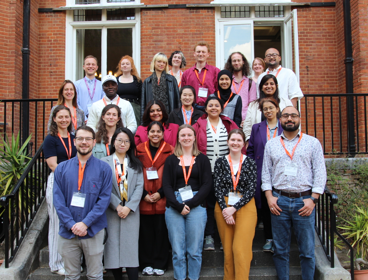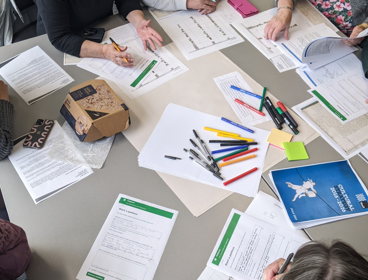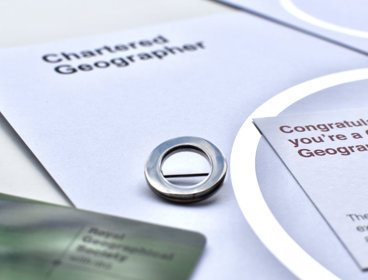Dr Iain Douglas-Hamilton and Dr Jake Wall have been awarded the Esmond B. Martin Royal Geographical Society Prize for 2025.
The Prize, created by a generous bequest from the late renowned geographer and conservationist Esmond Bradley Martin, recognises outstanding individual achievement in the pursuit and application of geographical research, with a particular emphasis on wildlife conservation and environmental research studies. This year, the Prize committee has recognised two exceptional elephant conservationists.
Dr Iain Douglas-Hamilton has dedicated nearly six decades to elephant conservation and his pioneering 1972 doctoral thesis on elephant social dynamics and movements shaped contemporary understanding of elephant societies and informed conservation strategies across Africa. As the founder of Save the Elephants in 1993, Iain revolutionised elephant conservation with the use of GPS tracking technology, which provided critical data to combat poaching, habitat loss, and human-wildlife conflict.
Alongside Iain's pioneering research and use of hard data to help protect elephants, he has also been instrumental in policy advocacy, alerting the world to the African elephant ivory poaching crisis in the 1970s and 1980s that led to the international ban in ivory trade in 1989. Iain’s ongoing advocacy against ivory poaching has been transformative and, in 2013, he co-founded the Elephant Crisis Fund, which has raised over £30 million to combat poaching, disrupt ivory trafficking, and reduce demand.
Iain is deeply committed to mentoring conservationists and empowering local communities, particularly in Kenya, where he has nurtured talent, fostering leadership and technical expertise. Iain’s impact has grown from the early efforts of one man to a powerful eighty-strong, Kenya-based organisation closely working with, and often financially supporting, a network of hundreds of conservation colleagues continent wide.
On being awarded the Prize, Iain said: “Esmond’s meticulous and often intrepid cataloguing of ivory markets were highly influential in saving elephants from the trade in their tusks. I believe that data and science are vital for elephants to have a voice in their future, and this embodies our approach at Save the Elephants.
“I’m hugely honoured to receive this prize, and to share it with Jake Wall, who has done so much to reveal the scale and detail of elephant lives through his work on systems to visualise and analyse their movements.”
Dr Jake Wall has been at the forefront of leveraging technology to create freely available geospatial tools for the benefit of wildlife conservation in Africa and beyond for the last 20 years. Jake’s dedication and passion for wildlife is matched only by his tireless efforts to provide conservationists with the tools and methods they need to better protect the natural world.
As Director of Research and Conservation for the Mara Elephant Project (MEP), Jake established a long-term elephant monitoring programme and developed an application to easily map landscapes, especially fences, which have become a major threat to wildlife movements in the Mara ecosystem. Prior to working with MEP, Jake worked as the Geospatial Scientific Advisor to Save the Elephants for 15 years where he developed a real-time tracking system to visualise GPS data from collared African elephants across the continent. Algorithms scanned the data and, among other things, sent alerts when elephants had moved unusually fast, suggesting panic, or had stopped moving which might indicate a poaching event. In partnership with Save the Elephants and the Allen Institute for AI, this system was expanded into EarthRanger, now used by over 600 sites across 74 countries and growing rapidly.
To complement EarthRanger, Jake is now leading the development of Ecoscope, which provides users with access to ready-made analytics from sources of publicly available remote sensing data. It allows researchers and conservationists to easily engage with the data and generate meaningful outputs, thereby turning conservation data into information to improve decision making, insight and the protection of ecosystems.
On being awarded the Prize, Jake said: “I am deeply honoured and humbled to be awarded the Esmond B. Martin Royal Geographical Society Prize. It is especially an honour to be awarded alongside Dr. Iain Douglas-Hamilton who has been a mentor and continues to inspire with his tireless mission to conserve elephants and the landscapes they inhabit. I am very grateful to both Esmond and Iain for all that that they have done for elephants and conservation.”
Professor Joe Smith, Director of the Society said: “Iain and Jake represent the best of wildlife conservation – few have done as much as them to advance the application of geographical research and technology to this mission. Their work epitomises the spirit of the Esmond B. Martin Royal Geographical Society Prize, embodying innovation, dedication, and a profound commitment to solving the pressing challenges facing wildlife.”
Dr Jake Wall will be presented with his award on Monday 7 April, when he will also give the Society’s Monday night lecture. During the evening, Professor Fritz Vollrath will collect Dr Iain Douglas-Hamilton’s award on his behalf.



